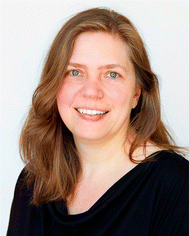Looking back over 10 years of Materials Horizons
Martina H
Stenzel
School of Chemistry, University of New South Wales, Sydney, NSW 2052, Australia. E-mail: m.stenzel@unsw.edu.au
Abstract
Current Editorial Board Chair Martina Stenzel reflects on the last 10 years of the journal in celebration of the 10th anniversary of Materials Horizons, looking back at her time as Scientific Editor, and now Chair of the Editorial Board.
Just over 10 years ago, back in 2012, I had a conversation with Liz Dunn about a new addition to the RSC journal family. I was asked to take on the role of Scientific Editor and help identify submissions suitable for the journal. I was excited by the challenge, but I was also aware that this is a huge responsibility as the articles published in the first year of a journal's life will quickly set the tone - so we needed to get this right!
Initially, I thought that every new journal wants to be a top journal with a high impact factor. This is relatively easy as all we need to do is to (a) focus on papers of hot research areas, (b) focus on review articles and (c) focus on review articles of hot areas! This will quickly drive citations and impact factor up!
However, I learned from Seth Marder and the team that we are trying to do something different. We wanted to create a journal that serves the community in different ways. The title of the journal, Materials Horizons, should already imply that we wanted to serve as a publishing platform for materials research that is still emerging, research that explores a new concept and perhaps research where we don’t yet know where it is heading. This can be research that is curiosity driven, but also research that tries to solve an old problem using a new approach. This ‘new concept’ became an integral part of Materials Horizons. However, what is a new concept? A new concept is not an improvement of an existing system with little tweaks here and there. It is rather a new approach to an old problem or a different direction of an established field. Maybe this new horizon even takes us to the launch of an entirely new materials field. We wanted to offer a publishing platform that is not focusing on hot papers in an already active field, but a stage for new and unusual ideas.
Showcasing new directions
This new journal also wanted to serve the community in different ways. Scientific papers are often only written for experts in the field, which makes it difficult for others outside the circle of experts to appreciate the topic. Therefore, the New Concepts statement was born! This paragraph should summarize the underpinning idea of the presented research in a language that can also be understood by other researchers, students and maybe even non-scientists. While it can be daunting to formulate the idea of your research in easy-to-understand language, I think it serves a very important purpose as it can help showcase the advancement of material science in a broader context. The New Concept statement will also in future remain an integral part of our publications.Fresh ideas from the entire community
When I joined Materials Horizons, I was also impressed with the diversity of the Editorial Board, but even more with all the fresh ideas to include younger researchers. Early-career researchers were invited to join a Community Board, where they could provide feedback, but also get involved with the process. Horizons Community Board Collections are themed collections of research papers curated by our early career board members, framed by an editorial piece on the topic.It is also important to highlight the achievements of younger researchers, less than 10 years out of their PhD. We therefore showcase, on a monthly basis, outstanding research carried out by researchers that are relatively new to the world of academia. All submitting authors eligible for this series are considered for selection every month and we have already celebrated a great many of these outstanding emerging investigators in our ongoing collection.
I think in the last 10 years, Seth and the team fulfilled the vision of a journal having a more diverse approach to publishing. Many other journals since then have followed suit and created similar boards with focus on a more inclusive approach to publishing.
A bright future
When Seth concluded his time as chair of the Editorial Board, he entrusted me with an already well-established journal that has fulfilled all its initial promises. With the help of the RSC team, the enthusiastic Community Board and the experienced and engaged Advisory and Editorial Boards, we will steer the journal through the next 10 years. The journal will continue to serve as a platform for new ideas in the materials field and we would like Materials Horizons to be home of unusual approaches to materials science.However, we cannot rest on our laurels as we see a lot of changes in publishing. The discussion on the role of journal articles in discovery science is ongoing. We see changes on many levels such as the mandate for Open Access, the phasing out of printed journals, paper mills, the use of AI (which includes the buzz around ChatGPT), and the use and misuse of social media among other topics. Here the role of established publisher, such as the RSC, becomes even more important as we can serve as a platform for informed discussions. Articles such as Focus articles or Opinion pieces that engage with specific topics and challenges will become even more important to ensure that sensible voices are not drowned out by misinformation.
I am looking forward to serving the community in my role as Chair of the Editorial Board to tackle the challenges ahead of us over the next 10 years.
Martina Stenzel
Editorial Board Chair, 2021–present
Scientific Editor, 2013–2021
| This journal is © The Royal Society of Chemistry 2023 |

